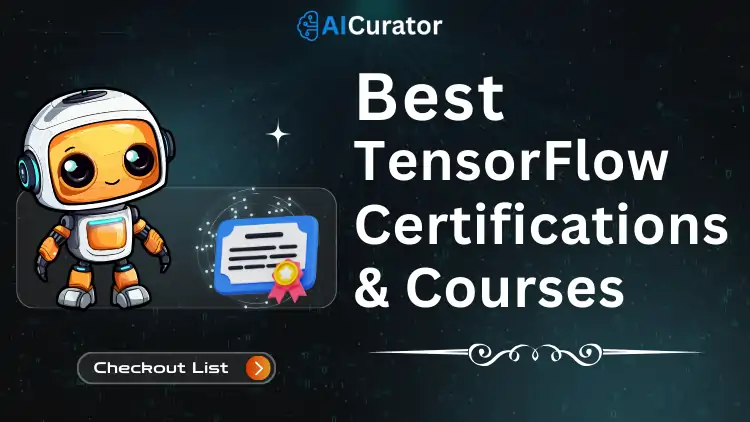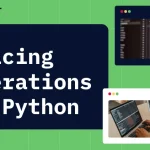TensorFlow has become the backbone of machine learning development, powering everything from simple neural networks to complex AI systems. With over 180,000 GitHub stars and adoption by major tech companies worldwide, mastering TensorFlow isn't just valuable—it's essential for any serious ML practitioner.
The demand for TensorFlow skills has surged dramatically, with job postings requiring TensorFlow expertise increasing by 73% year-over-year. Whether you're a software developer transitioning into AI or a data scientist looking to strengthen your deep learning toolkit, the right TensorFlow certification can accelerate your career trajectory.
This comprehensive guide explores the top TensorFlow certifications and courses available in 2025, helping you choose the perfect programme to match your goals and experience level.
Why TensorFlow Certifications and Courses Matter in 2025?

The AI job market has become increasingly competitive, with employers seeking candidates who can demonstrate practical, hands-on experience with industry-standard tools. TensorFlow certifications serve as concrete proof of your abilities, often making the difference between landing an interview and getting overlooked.
Key benefits of TensorFlow certification include:
Complete TensorFlow Certification Comparison Guide
| Programme | Cost | Level | Best For | Rating (out of 5) |
|---|---|---|---|---|
| DeepLearning.AI TensorFlow Developer Professional Certificate | $49/month | Beginner–Intermediate | Learners aiming for hands-on TensorFlow skills and Google’s TensorFlow Developer Certificate prep | 4.6 |
| TensorFlow for Artificial Intelligence, Machine Learning, and Deep Learning | $49/month | Beginner | Developers who want a fast, practical start with TensorFlow basics and computer vision/NLP tasks | 4.5 |
| Udacity – Intro to Machine Learning with TensorFlow Nanodegree | Individual Course₹42,272.50 / one-time payment | Intermediate | Learners seeking project-based portfolio building with dual exposure to PyTorch and TensorFlow plus career services | 4.4 |
| Udacity – Intro to TensorFlow for Deep Learning | Free course content available; Nanodegree by subscription | Beginner | Beginners who want a free, hands-on start with TensorFlow and practical exercises from Google engineers | 4.3 |
| Machine Learning with TensorFlow on Google Cloud Platform | $49/month | Beginner–Intermediate | Cloud-focused practitioners who want GCP-first ML pipelines and deployment practice with TensorFlow | 4.5 |
1. DeepLearning.AI TensorFlow Developer Professional Certificate
The DeepLearning.AI TensorFlow Developer Professional Certificate stands as the gold standard for TensorFlow education. Created by Andrew Ng's team at DeepLearning.AI, this comprehensive programme was specifically designed to prepare students for Google's TensorFlow Developer Certificate exam.
What Makes This Programme Special?
This hands-on certification consists of four progressive courses that build your skills from basic neural networks to advanced applications in computer vision and natural language processing. The curriculum emphasises practical implementation over theoretical concepts, ensuring you gain job-ready skills.
Core curriculum includes:
Key Programme Features
- Duration: 4 months (5 hours per week).
- Format: 16 Python programming assignments with hands-on projects.
- Instructor: Laurence Moroney (Google AI Developer Advocate).
The programme covers essential techniques like preventing overfitting through data augmentation, implementing dropout layers, and using transfer learning for improved model performance. Students work with real-world datasets and learn to handle the challenges that arise in production environments.
Skills You'll Master
- Computer vision: Build models that can identify and classify images.
- Natural language processing: Create systems that understand and generate human language.
- Sequence modelling: Implement RNNs, GRUs, and LSTMs for time-series analysis.
- Model optimisation: Apply techniques to improve network performance.
2. TensorFlow for Artificial Intelligence, Machine Learning, and Deep Learning
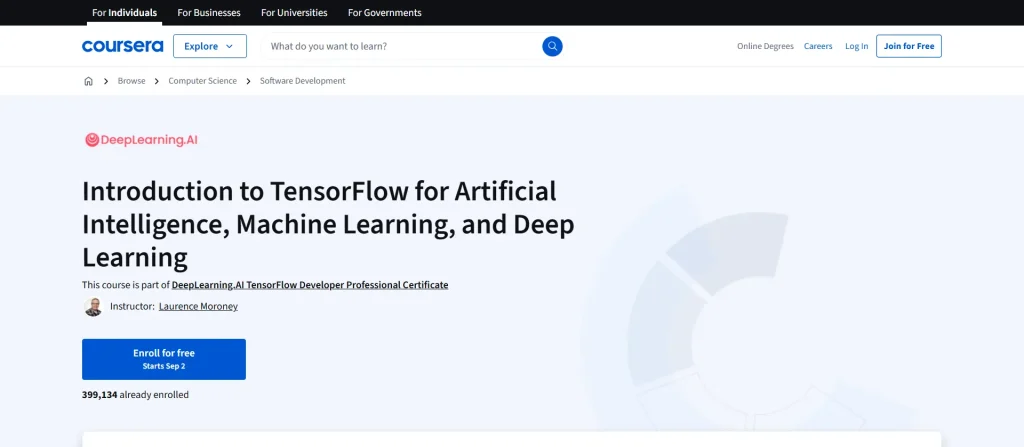
This focused course serves as the foundation for many TensorFlow learning paths. Offered through Coursera, it targets software developers with prior Python experience who want to implement machine learning solutions using TensorFlow.
Programme Highlights
The course demonstrates foundational principles of machine learning and deep learning through practical TensorFlow implementation. Rather than getting lost in complex theory, students immediately start building functional models.
What you'll accomplish:
Learning Approach
- Duration: 4 weeks (4-5 hours per week).
- Prerequisites: Basic Python programming knowledge.
- Project focus: Building functional ML applications from day one.
The instructors provide abundant practical examples with tips and techniques drawn from real-world experience. Students appreciate the flexible deadlines and the emphasis on hands-on coding rather than lengthy theoretical discussions.
3. Udacity – Intro to Machine Learning with TensorFlow Nanodegree
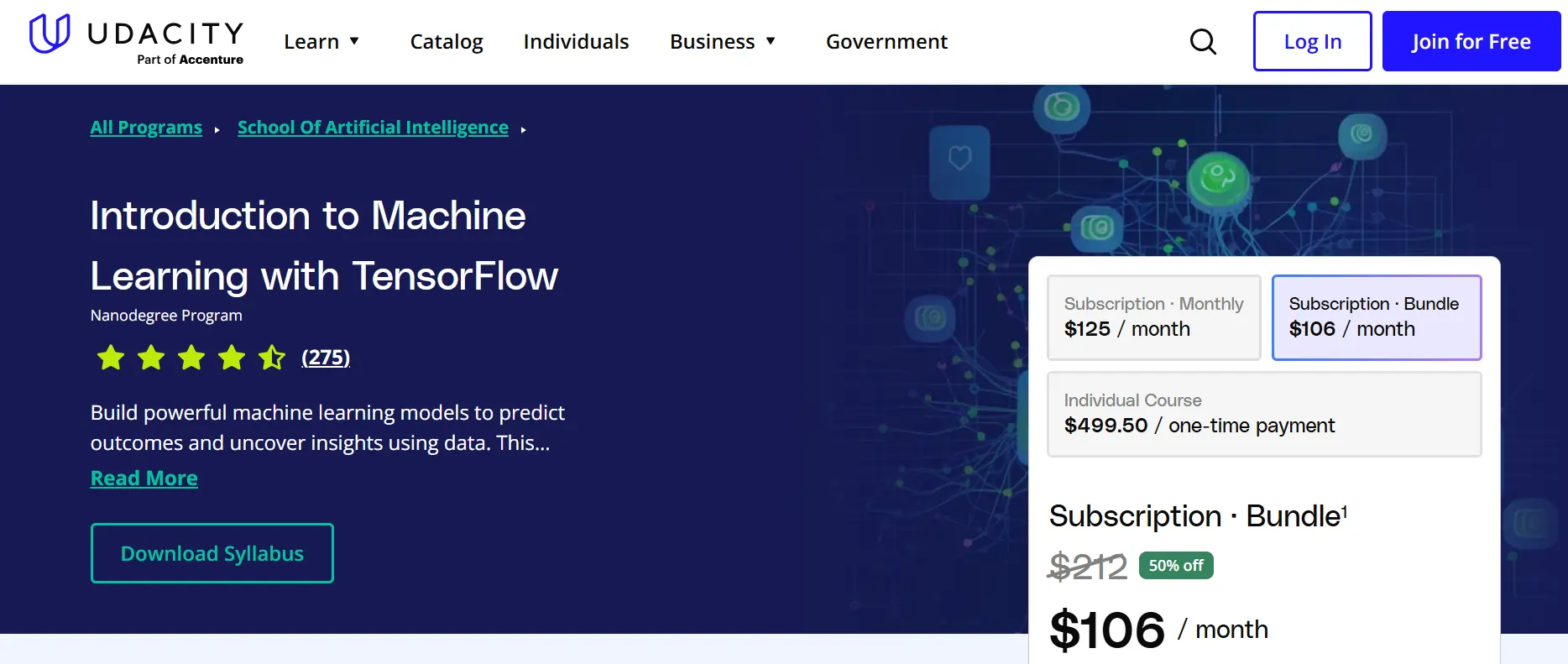
Udacity's machine learning nanodegree programme offers a comprehensive introduction to ML concepts using both PyTorch and TensorFlow frameworks. This programme stands out for its project-based learning approach and industry mentorship.
Unique Programme Benefits
Unlike traditional courses that focus on a single framework, this nanodegree provides dual-framework exposure, allowing students to understand the strengths of both PyTorch and TensorFlow. This versatility proves invaluable in professional settings where different projects may require different tools.
The programme structure includes:
Career Support Features
- Duration: ~3 months (flexible self-paced).
- Mentorship: Access to industry professionals and technical mentors.
Students receive personalised feedback on every project submission, ensuring they understand not just what to do, but why specific approaches work better than others. The programme includes career coaching, resume reviews, and interview preparation.
Hands-On Project Examples
- Cancer diagnosis prediction: Using supervised learning for medical applications.
- Fraud detection system: Applying ML to financial security.
- Customer segmentation: Implementing clustering for business intelligence.
- Deep learning implementation: Building neural networks with both frameworks.
4. Udacity – Intro to TensorFlow for Deep Learning
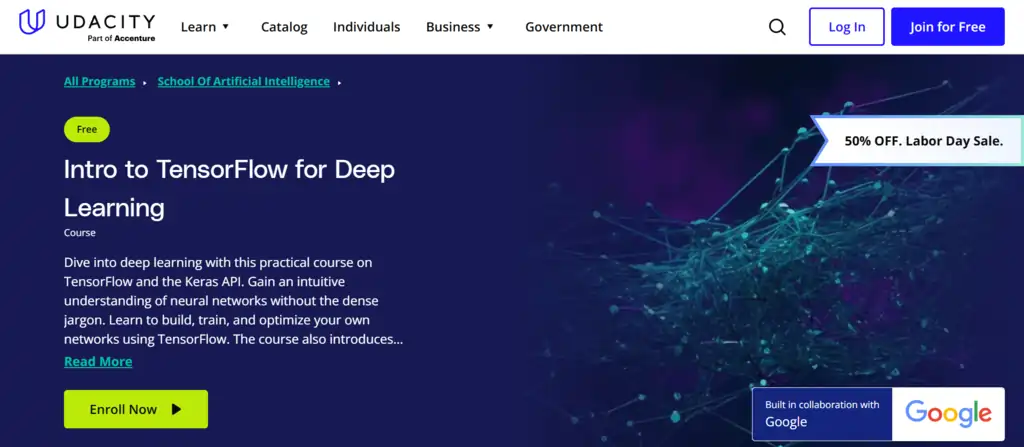
This free course from Udacity focuses specifically on TensorFlow implementation for deep learning applications. Developed in partnership with Google, it provides an excellent entry point for developers new to deep learning.
Course Advantages
The programme's greatest strength lies in its practical approach combined with expert instruction from Google engineers. Students learn TensorFlow through hands-on exercises rather than theoretical lectures.
Key learning outcomes:
What Sets This Apart?
- Cost: Completely free.
- Accessibility: Available to anyone with internet access.
- Industry relevance: Content developed by TensorFlow creators at Google.
The course includes interactive tutorials and provides all study materials at no cost. Students work through real coding exercises that mirror the challenges faced by professional ML engineers.
5. Google Cloud Platform– Machine Learning with TensorFlow
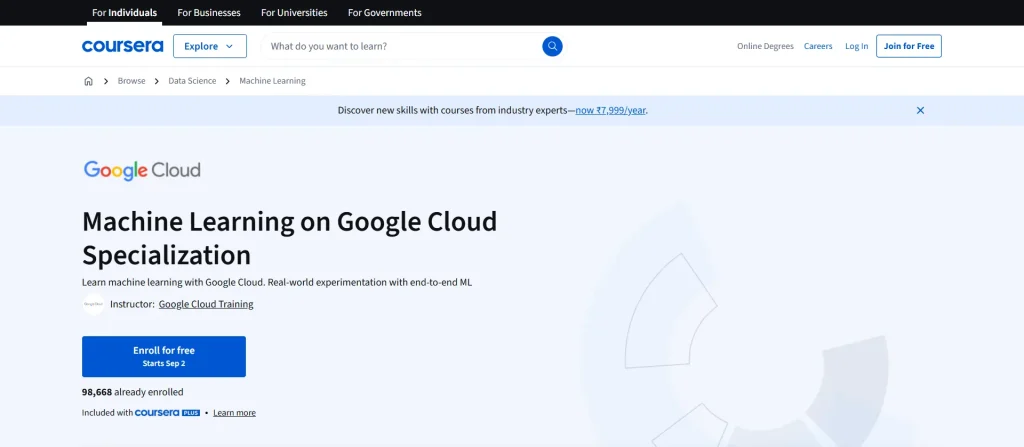
Developed directly by Google Cloud, this specialisation programme teaches machine learning implementation using Google's cloud infrastructure alongside TensorFlow. It's ideal for professionals who need to understand enterprise-scale ML deployment.
Enterprise-Focused Learning
This programme bridges the gap between local development and production deployment. Students learn not just how to build models, but how to scale them for real-world use.
Curriculum highlights:
Programme Structure
- Duration: 1 month (14 hours per week).
- Focus: Cloud-based machine learning operations.
The structured curriculum includes five specialised courses covering everything from basic ML concepts to advanced deployment strategies. Students gain hands-on experience with Google's cloud ML tools and learn industry best practices for ML operations.
Choosing the Right TensorFlow Certification Path
Your ideal certification depends on several factors: current experience level, career goals, time availability, and budget constraints.
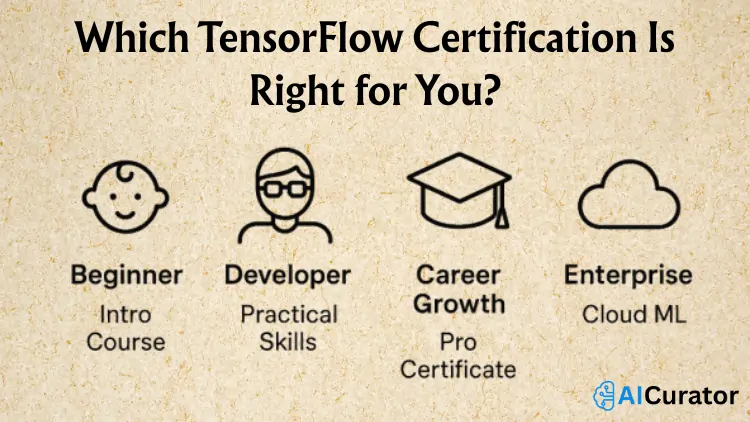
🆕 For Complete Beginners
Start with Udacity's free Intro to TensorFlow course to gauge your interest and aptitude.
If you find it engaging, progress to the DeepLearning.AI Professional Certificate for comprehensive coverage and industry recognition.
👨🏼💻 For Experienced Developers
The TensorFlow for AI, ML & Deep Learning course provides quick, practical implementation skills.
Follow up with Google Cloud's ML specialisation if your work involves cloud deployment.
🚀 For Career Advancement
The DeepLearning.AI Professional Certificate offers the strongest industry recognition and directly prepares you for Google's official TensorFlow Developer Certificate exam.
💼 For Enterprise Professionals
Google Cloud's ML with TensorFlow specialisation focuses specifically on production deployment and enterprise-scale considerations.
Maximising Your Certification Investment

Success with TensorFlow certifications requires more than just completing coursework. Here are proven strategies to maximise your learning investment:
Start Your TensorFlow Journey Today

The AI revolution isn't waiting—and neither should your career development. Whether you choose the comprehensive DeepLearning.AI Professional Certificate or start with Udacity's free introduction, the key is beginning your journey today.
Each programme offers unique advantages, but they all share one common trait: they transform theoretical knowledge into practical skills that employers value.
In today's competitive market, TensorFlow certification isn't just an advantage—it's becoming essential for anyone serious about machine learning careers.
Choose your certification path based on your current situation, but don't delay getting started. The sooner you begin, the sooner you'll join the ranks of certified TensorFlow professionals shaping the future of artificial intelligence.
Recommended Readings:







